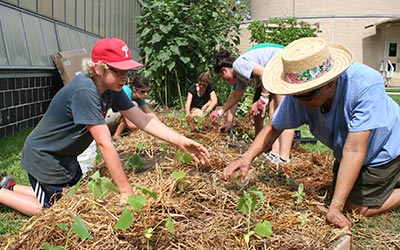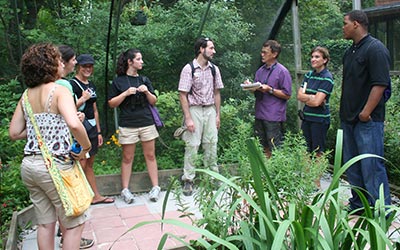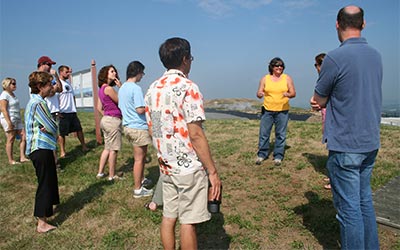Sustainability
Certificate
What is Education For Sustainability?
As our planet faces unprecedented environmental, social, and economic crises, we are all being challenged to make dramatic changes not only in our knowledge and values, but also in our culture and institutions. Education For Sustainability responds to this challenge.
"We learn what we live"
Education For Sustainability (EFS) is a rapidly emerging field that is guided by a vision of a sustainable society and rooted in a simple truth: we learn what we live. EFS practitioners are trained professionals who understand the challenge of sustainability and who have been prepared to teach others, to catalyze institutional and cultural change, and to model sustainable ways of living.
Earn a Certificate in EFS
Many EFS practitioners work in K-12 schools where they integrate sustainability content into curricula, lead efforts to "green" buildings and grounds, and raise critical questions about the purposes of education on a planet with limits. EFS practitioners also work in:
- Colleges and Universities
- Corporations
- Nonprofits
- Community-Based Organizations
- Religious Institutions
"Be the change"
EFS practitioners are people who strive to "be the change" and embody the conviction that "human development is primarily about being more, not having more." Given accelerating regional, national, and global attention to sustainability, the demand for EFS practitioners is expected to grow dramatically. Indeed, the challenge of sustainability may spark the most creative period in human history. Whether you work in a classroom, a community organization, or the offices of a business, you are invited to join this great work of sustainability as an EFS practitioner.
The Programs and Course Requirements
West Chester University offers two certificate programs in Education For Sustainability (EFS), an Undergraduate Certificate in EFS and a Graduate Certificate in EFS.
These innovative programs prepare participants to create real change in their professions, communities, and daily lives. The EFS curriculum develops the necessary knowledge, skills, and perspectives in a way that integrates classroom work with plenty of outdoor, experiential, and project-based learning. The result is a certificate that is meaningful and immediately applicable. The parallel undergraduate and graduate programs feature combined sections that provide opportunities for mutually beneficial mentor-mentee relationships between working professionals and undergraduates with shared interests. Most students will also complete an EFS Certificate with a cohort - a community of learners who collaborate on various projects and establish lasting professional relationships.
Undergraduate Certificate in EFS
The 12-credit undergraduate certificate program in Education For Sustainability (EFS) is designed for undergraduates and post-baccalaureate students who want to develop their understanding of sustainability and apply their learning on campus, at home, and in their future careers. The program consists of four courses that provide the perspective, experiences, and practical methods needed to immediately put your learning into practice.
To earn the undergraduate EFS certificate, candidates must complete the following:
- EDO 400: Environmental & Sustainability Education: History, Theory, & Practice
- EDO 410: Systems in Sustainability Education
- EDO 420: Outdoor and Place-Based Education
- EDO 450: Education For Sustainability: Methods and Field Experience
Graduate Certificate in EFS
The 12-credit graduate certificate program in Education For Sustainability (EFS) is designed for professionals who want to further develop their understanding of sustainability and use their work sites to apply learning. The program consists of four required courses and two electives that provide the perspective, experiences, and methods needed to promote sustainability in your school, workplace, or community.
To earn the graduate EFS certificate, candidates must complete the following:
- EDO 500: Environmental & Sustainability Education: History, Theory, & Practice
- EDO 510: Systems and Sustainability
- EDO 520: Outdoor and Place-Based Education
- EDO 550: Education For Sustainability: Methods and Projects
To enroll in either the Undergraduate or Graduate Certificate Program in EFS,
email Dr. Paul Morganor call him at 610-436-6945.
Contact Information
- Dr. Paul Morgan
- EFS Director/Associate Professor
- Educational Foundations & Policy Studies
- 512 Wayne Hall
- West Chester University
- West Chester, PA 19383
- 610-436-6945
"We must join together to bring forth a sustainable global society founded on respect for nature,universal human rights, economic justice, and a culture of peace."
— The Earth Charter
Apply Now WCU Sustainability Site



